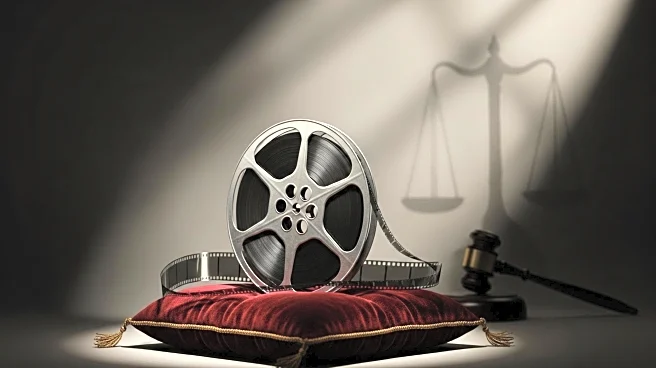What's Happening?
Daniel Bekerman, founder of Scythia Films, a Canadian independent film studio, encountered legal challenges from President Trump when his company attempted to release 'The Apprentice,' a film exploring Trump's origins. The film, starring Sebastian Stan and Jeremy Strong, faced cease-and-desist letters from Trump's lawyers, which Bekerman described as lacking seriousness and primarily serving entertainment purposes. Despite these challenges, Scythia Films continues to produce original content and provide production services for U.S. studios filming in Canada. Bekerman emphasizes the importance of diverse storytelling in an industry he views as increasingly conservative and homogenized.
Why It's Important?
The legal actions against 'The Apprentice' highlight the ongoing tension between political figures and the entertainment industry, particularly when content challenges or critiques those in power. This situation underscores the broader issue of freedom of expression in filmmaking and the potential influence of political figures on media narratives. For the U.S. film industry, this case exemplifies the challenges faced by independent filmmakers in navigating legal and political pressures while striving to tell diverse and bold stories. The outcome of such disputes can impact the types of stories that reach audiences and the creative freedom of filmmakers.
What's Next?
As the film industry continues to evolve, independent producers like Bekerman may increasingly rely on international co-productions to mitigate market instability and political pressures. The response from the broader film community and potential legal outcomes could influence future projects and the willingness of filmmakers to tackle controversial subjects. Additionally, the industry's reaction to such legal challenges may shape the landscape for storytelling and the balance between creative expression and political influence.
Beyond the Headlines
This case raises questions about the ethical responsibilities of filmmakers in portraying real-life figures and the potential consequences of political interference in artistic expression. It also highlights the role of storytelling in shaping public perception and the power dynamics between media creators and political entities. The situation with 'The Apprentice' may serve as a precedent for future interactions between the entertainment industry and political figures, influencing how stories are told and who gets to tell them.









